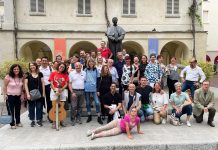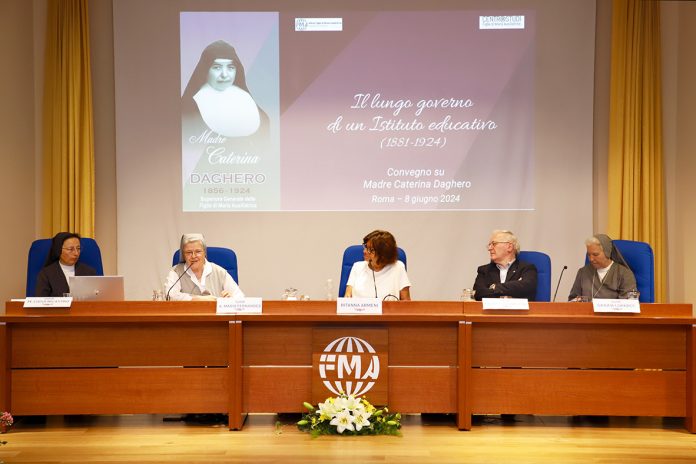Rome (Italy). On 8 June 2024 in Rome, in the Generalate of the Institute of the Daughters of Mary Help of Christians, the Conference, “The Long Government of an Educative Institute (1881-1924)” on Mother Catherine Daghero, on the Centenary of her death, promoted by the FMA Institute and the Center for Studies on the Daughters of Mary Help of Christians of the Pontifical Faculty of Education “Auxilium”.
The Conference was attended by more than 150 people – in addition to the FMA Community Mary Help of Christians of the Generalate and Sacred Heart – including Mother General Emeritus, Sister Yvonne Reungoat; Superior of the Preprovince Mary Mother of the Church (RMC); Sister Jessica Salvaña, the Provincial of St. John Bosco Province (IRO), Sister Gabriella Garofoli; the President of the World Confederation Mornese FMA Past Pupils, Mrs. Maria Carmen Castillon. The great-granddaughter of Mother Caterina Daghero, Sandra, and her aunt Silvana, as well as the ambassador of Haiti to the Holy See, H.E. Jean Jude Piquant, were also present in the room, in gratitude for what the FMA are doing for young people in her Country.
The Secretary General, Sister Maria Luisa Nicastro, who coordinated the organization of the Conference, welcomed the participants in the room and connected via live streaming and invited Mother Chiara Cazzuola on stage. In her greeting, Mother highlighted the celebration of the Centenary as a providential opportunity to rediscover the greatness of Mother Mazzarello’s first successor:
“A Daughter of Mary Help of Christians who illuminated the first fifty years of the history of the Institute, in a very delicate phase, safeguarding fidelity to the origins and, at the same time, cultivating and realizing the dream of an ever-wider mission. A humble and wise woman, who has walked a difficult path between lights and shadows, in a time full of challenges and calamities, always aimed at the goal with hope and trust in the Lord of history who makes everything contribute to the good in the existence of those who love Him.”
Then there alternated the institutional greetings by: Mother Micaela Monetti, President of USMI and Superior of the Pious Disciples of the Divine Master; Fr. Andrea Bozzolo, Rector of the Salesian Pontifical University (UPS); Sister Piera Ruffinatto, Dean of the Pontifical Faculty of Education Science “Auxilium” and native of Cumiana, native country of Mother Daghero. Greetings were also received via message or video, from Miguel Gotor, Councilor for Culture of Rome Capital; Monica Canalis, Councilor of the Piedmont Region; Angela Bertero, author of the biography “The courage to dream of the future. Life and mission of Mother Catherine Daghero”.
The Conference began with the projection of a video with the main stages of the life of Mother Daghero, made by the Communication Department of the Institute with the photographic and audiovisual support of the General Archive, which prepared the participants for listening to the reports.
Sr. Grazia Loparco, Lecturer of the Faculty “Auxilium”, then presented the moderator, the journalist and writer, Ritanna Armeni, member of the steering committee of the magazine, “Woman, Church, World” of the L’Osservatore Romano, thanking for the opportunity to know “an exceptional woman,” who introduced Fr. Francesco Motto, Salesian of Don Bosco, one of the founding members of the Salesian Historical Institute (ISS) and founder of the Association of Scholars of Salesian History (ACSSA).
Fr. Motto, with vivacity and precision, traced out a synthetic historical picture of society from the late nineteenth to the first post-war period – time in which Sister Caterina Daghero was Mother General of the Institute of the FMA (1882-1924). He did this from the economic social, cultural, political-diplomatic, and women’s world viewpoints emphasizing these aspects as great challenges for an Institute embodied in the territory and among the people.
The fresco painted by Fr. Motto, with the complexity of the characters and historical factors that change the scenario in which Mother Daghero is called to govern, giving rise to unprecedented institutional processes, formed the basis of the intervention of Sister Grazia Loparco, who spoke of the transformation of the Institute faced with resourcefulness by Mother Catherine, revealing herself at the height of the times, within a religious family that grew at an exponential rate, and the change of educative needs.
This was followed by the presentation of Sister Ana María Fernandez, Argentine FMA, scholar of the history of the Institute on “The missionary dimension of the government of Mother Caterina Daghero and Argentina.” Sister Ana Maria spoke of the missionary ardor of the beginning of the Institute, surely breathed by Mother in Mornese, while Don Bosco prepared the first missionary departure, and the FMA were preparing themselves by studying Spanish.
Argentina played a particular role in the first decades of the Institute’s missions, so much so that in 1895 Mother Daghero herself joined the Sisters and the works of nineteen houses – ten of the Buenos Aires Province, eight of the Patagonian Province, and one of the Province of St. Michael. She returned after two years, enriched by the journey, “with the possibility of looking at Europe from the American perspective, of perhaps intuiting in the Institute that developed overseas, aspects of novelties arising from the charism embodied in such different contexts, in contact with different cultures.”
In the afternoon, the work resumed with the report of Sister Maria Concetta Ventura, member of the ACSSA, curator of the Diary on the occasion of the first trip to America of the Superior General Sister Caterina Daghero (1895-97) who deepened the Letters of Mother Daghero to the FMA, of which she is editing a publication in two volumes, soon to be released.
The Epistolary of Mother Caterina Daghero contains 1098 letters to the FMA or to young people who wished to become one, and 139 to other people, mostly Salesian Superiors. From Sister Maria Concetta’s report, the inner world of Mother emerged, because “The Epistolary of a person is almost always a first quality source in the reconstruction of the events that occurred and even more, of the inner attitudes, interests, emotions, dreams, and intentions of the author.”
“Writing, receiving answers, being able to read them is a functional need of those who leave, of those who are far away, but it is also – and above all – a functional need of those who return; of those who have seen another world and no longer want to go back to being simply what was.” This is how Giulia Galeotti, journalist of L’Osservatore Romano and writer, re-read in her presentation the Letters of Mother Daghero from her personal perspective, making emerge, “a woman who travels tirelessly, initiates contacts, writes continuously, organizes, connects people of the most disparate places, creates bonds, triggers wide solidarity.” A woman also of extreme concreteness, who is not afraid to show her own fragility; a woman of witness, who knows how to move through the crises of her time.
Giulia Galeotti ended her presentation with a phrase by the writer Italo Calvino: “The biography, even if it is public, remains an inner thing, who will grasp it?” “And who knows if I grasped it” – he added – “but it was definitely an interesting attempt!”
Sr. Piera Cavaglià, already Secretary General of the FMA Institute, deepening the “Charismatic-educational aspects of the government of Mother Caterina Daghero”, completed the precious tapestry on her life and government given by the interweaving of all the speakers, calling her a woman who, while living a modest reality – Cumiana, Mornese, Nizza, St. Cyr-sur-Mer -“has the premonition of new times”:
“She lives history in the simplicity of everyday actions, but she cultivates great visions and educates to cultivate them. For her, the educational mission is not only a mission for evangelization, but for ‘social regeneration’. Thus, she says: “To work! We must always be at the forefront of charity. This capacity for openness, and flexibility is truly generated in her by the ardor of the ‘da mihi animas’; by the, ‘I entrust them to you’ of Mother Mazzarello.”
After a short space left for the resonances, the day ended with a “musical surprise” by the Novices of the International Novitiates, Sister Teresa Valsé Pantellini of Rome and Mary Help of Christians of Castelgandolfo, who sang “Ho visto in te” (I saw in you), born of their encounter with Mother Catherine Daghero.
The Conference has certainly achieved its objectives, with positive feedback and appreciation expressed in ‘chat’ from all over the world – Ethiopia, South Sudan, Congo, Brazil, Argentina, Haiti, East Timor, Indonesia, India, Poland, Tunisia, Mongolia… – highlighting a multifaceted, resourceful, far-sighted figure; a woman of extraordinary relationship, realism, and essentiality, tender and close to her Sisters, and at the same time, firm and concrete, full of missionary zeal in reaching and knowing the realities in which they lived. A woman and a Sister “according to the heart of God.”
Photos: Flickr FMA




















